The making of The Salt Man
To BIAFF 2016 results| To Full Making Of Index
Seyed Sajad Moosavi won four stars and the UNICA Medal* at BIAFF2016
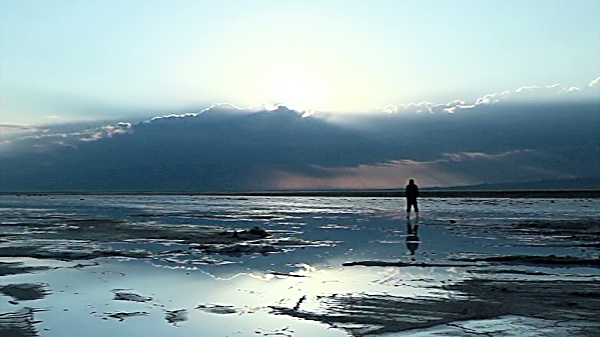
Beginnings
Actually, for years that I have had in mind making a film on this topic, but it was not possible. Further on though, as I went under the pressure of not being supported and helped, as a young director who has won many international awards and despite all problems that lay on my way, I made up my mind and started writing the screenplay to show the world a fragment of my difficulties.
It took me about two years until the job was done. Years ago, some salt men were discovered in a salt mine in Zanjan (my birthplace) which go back to around 2500 years ago. And I always look for new and creative ideas which no one else thinks of. There is also a salt mine near Tehran that renewed the idea in my mind whenever I passed it by. But there were many difficulties, especially since it was close to a nuclear site and we were not allowed to get there. Still, I am very glad that I made the film despite all existing problems.
I always try to have a unique look at my surroundings and ongoing events. So one day, I got a cab alone and got myself to the salt mine. Though it was not quite legal to get into the mine, I succeeded in making a relationship with some of the workers there and so, I could take some pictures from different locations before I got back to the city. The place is far away from the city, and it is not really easy to get there. “It’s just what I’m looking for,” I thought to myself as I was walking in the place. Of course, there is nothing special in there, and all the objects you see in the film are designed. But I really tried to make everything look natural and in the form of a documentary.
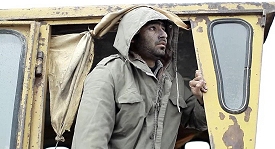
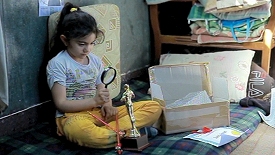
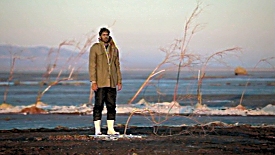
Practical Problems
The day on which the cast were supposed to come to the location, I really feared that someone might show up and spoil all our programme. Of course, it happened several times, but I managed to talk to the person in charge and buy some time until the job was over. It is really difficult to work in a salt mine, especially when it becomes rainy which turns everything into acid! All our clothes and shoes were spoiled in the time we spent there. But I really feel pity for the actors who had a really hard time. There was nothing in there; no water, no power, no light, nothing. And we had to travel some 50 kilometres every time a problem showed up and fetch something to the location. A chill goes through me when I remember those difficult days.
One of the problems we had to deal with was protecting equipment from the salt. We lost many lamps due to the acid air. Even one of our professional cameras broke as grains of salt went into it, and we had to pay a great sum in compensation. Everything is acidic in there. It is like you put your hand in a bag of salt for hours! As the job was over, I had to visit a skin doctor, and the actor had problem in his eyes.
Actors
The two actors were not related, they were simply actors. It was difficult to find them. No one desired to play this part, and no parents were willing to give us their little daughter to play in a salt mine. But, after making many promises and contracts, we finally talked them into it.
Getting a performance from the little girls might have been my most difficult task. I couldn’t get her to do what I wanted. She would cry and ask for her parents, and we had to fetch them for her. We had to deal with this problem for about a week. The little girl whose name was “Negin” – the same name as she had in the film – cried a lot, and we actually had to trick her to let us film her. Sometimes she would just walk away and say that she did not want to go on anymore. So the entire crew had to wait for a six-year-old kid to get back and let them film her. Notwithstanding all the difficulties though, I employed all my skills to get the best of her performance.
Music
The sound was really important here. I wrote the screenplay without any dialogue, and the music and narration work together throughout the film, which made my job even more trying. Moreover, I had to talk to psychologists and specialists to determine the best type of music which could relate all difficulties and at the same time, be original. Until a musician composed this masterpiece for me, which sometimes makes me cry as I think about the situation of the main character whose real name is “Majid.”
Colours
I attach great importance to colours in my works. I mean, I could summarise the whole film in these colours. The idea to sprinkle them on the salt was mine. Colour scheme really mattered to me, especially those that the little girl had to mix up with salt which was a very difficult task, since she had to make it all by herself, and she did not do it easily! And the special scene on which the salt man had to scatter all colours to the sky and make a big coloured-paper on the ground for the planes to see it was especially demanding and time-consuming.
All scenes are carefully planned and have each been thought over for days. And I have had many talks with specialists. You might even have noted that the colour in each scene has a particular meaning. It was also problematic since the colours were expensive and we had no second chances! But I feel it was worth taking the trouble as I see that people enjoy it.
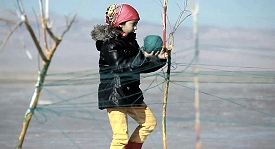
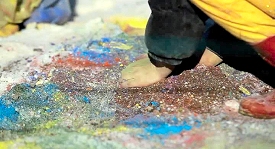
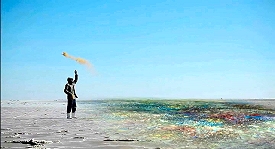
Reception
The film has been watched and has won many awards around the globe for its screenplay, cinematography, editing, music, and as the best short film. I have been to many festivals in many countries, such as Germany, Poland, Austria, Russia, China, and Romania. I was also supposed to travel to England for taking part in the festival, but despite all my efforts, unfortunately it was not possible. Though I would really love to attend the festival, and I hope that I will do one day. This film has also been nominated in Oscar quality festivals, which I hope it can pave my way to the 2017 Oscar Festival!
In Iran, however, the film has been watched not without fear! It has not been supported, nor particularly noticed. The more so, since it has won many awards in foreign countries, which makes them fear still more. They think that the film is trying to please foreign countries, and they do not accept the fact that it primarily deals with our situation in Iran. I was only 23 when I started making the film (and I am 25 now), and I was especially worried that I might be in trouble.
All costs have been paid personally and without any support. I am really glad I won the UNICA medal, and also because of the four-star grade which means a lot to me.
Right now, I am working on a short film with a really creative content, which I believe will not remain unnoticed. Moreover, I am trying to make a long movie about human rights and aiming to make peace and friendship between nations, with an English actor as the main character. Of course, that is what I am aiming for, and I will make it come true if I am allowed to do so.
Finally, I would like to thank you very much for everything. It is a great honour for me to win the prize. I also thank the jury. I read their careful comments and observations. I also thank the institute and the whole crew of the festival. I hope this will lead us to get more in touch for further friendship and cooperation.
- Seyed Moosavi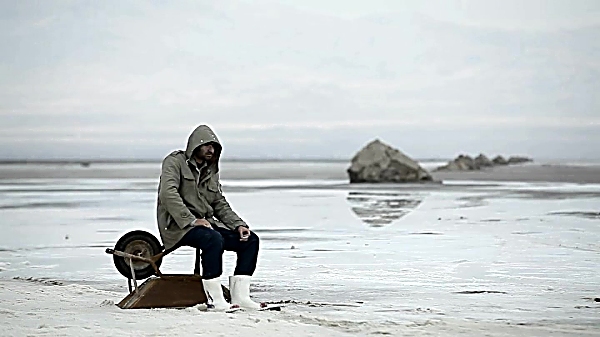
* UNICA (Union Internationale du Cinéma) bestows a special prize for each festival under the patronage of UNICA to the film or video production promoting solidarity between the nations, or using new forms of expression. The medal-winner is chosen by the festival's own jury.

